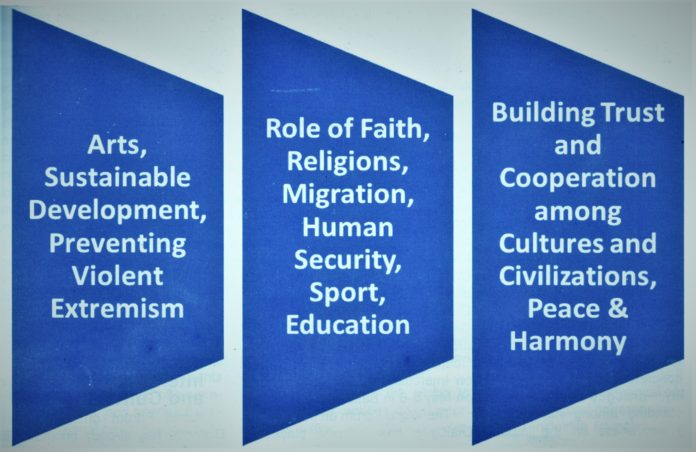Due to rapidly weakening socio-economic prospects in shape of “economic/national protectionism, increasing geo-political uncertainties in terms of “unilateralism” and rapidly geo-strategic maneuverings in shape of dividing the world between “ours and others” has raised the strategic importance of “intercultural dialogue” in the world among different faiths, sects, nationalities, philosophies, civilizations and countries. It is indeed the only way of human survival which increases chances of peaceful co-existence. It is of course the first step to achieve “sustainable development”.
The Republic of Azerbaijan arranged the 4th World Forum on Intercultural Dialogue in Baku with the theme “Advancing Intercultural Dialogue-New Avenues for Human Security, Peace and Sustainable Development”. It aimed at further promoting and sustaining understanding and dialogue within and between cultures.
The forum was organized in cooperation with UNESCO, the UN Alliance of Civilizations, the UN World Tourism Organization (WTO), the Council of Europe, the Islamic Educational, Scientific and Cultural Organization (ISESCO), the Food and Agriculture Organization of the United Nations (FAO) and the North-South Center of the Council of Europe.
Its agenda included topics such as the role of faith, religions, migration, human security, sport, education, art, sustainable development, preventing violent extremism, business in building trust and cooperation among cultures and civilizations.
It brought together nearly 120 officials from foreign countries, representatives of 39 international organizations and more than 50 non-governmental organizations, heads of governments, ministers, senior policy makers, cultural professionals, goodwill ambassadors, experts, journalists, practitioners, prominent intellectuals and activists.
During different sessions its aims to build an international platform to enable and encourage people, countries and organizations to take concrete actions to support diversity, dialogue and mutual understanding among nations by raising awareness on the importance of intercultural dialogue worldwide were thoroughly discussed.
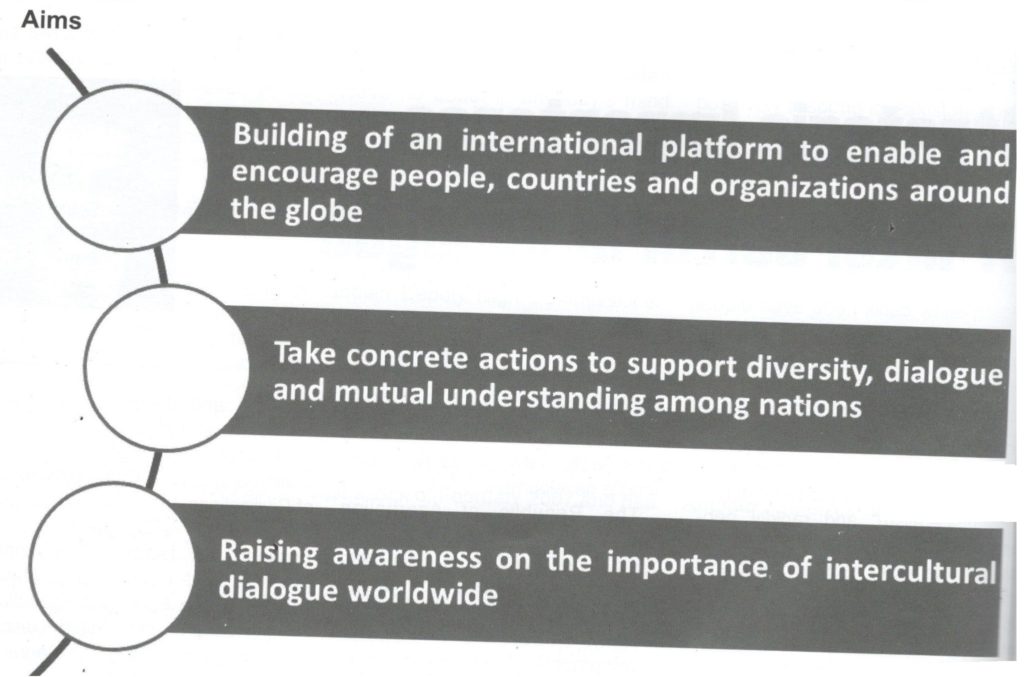
Azerbaijan is one of the unique places where different cultures and civilizations meet at the crossroad between the East and the West, the North and the South. At the same time, being a member of both Islamic and European organizations Azerbaijan absorbs the values of both civilizations, thus enabling it to assume role of a genuine bridge. Intercultural Dialogue was the brainchild of Azerbaijan’s visionary President H.E. Mr. Ilham Aliyev. Under his patronage and in cooperation with UNESCO, UN Alliance of Civilizations, UN World Tourism Organization, Council of Europe, ISESCO, North-South Center of the Council of Europe 4th World Forum on Intercultural Dialogue was held on May 5-6 in Baku.
The World Forum on Intercultural Dialogue has already played a remarkable role by taking responsibility for delivering the global agenda on the Dialogue among Civilisations adopted by the United Nations General Assembly (November 2001), the UNESCO Convention on Protection and Promotion of the Diversity of Cultural Expressions (2005), the Islamic Declaration on Cultural Diversity, which was adopted by ISESCO in 2004, Declaration and Action Plan of the Third Summit of the Heads of State and Government of the Council of Europe member states, the Council of Europe White Paper on Intercultural Dialogue (May 2008), as well as the Baku Declaration for the Promotion of Intercultural Dialogue.
Importance of Intercultural Dialogue and Cultural Diversity
World Forum on Intercultural Dialogue has already prioritized its agenda by placing intercultural dialogue and cultural diversity higher on the international agenda which is critical for human security and a prime responsibility of our time. World Forums organized so far have reached remarkable achievements by bringing together head of governments, ministers, and heads of various international organizations, senior policy makers, cultural professionals, goodwill ambassadors, experts, journalists, practitioners, prominent intellectuals and activists. The World Forums became an international platform to enable and encourage people, countries and organizations around the globe to take concrete actions to support diversity, dialogue and mutual understanding among nations by raising awareness on the importance of intercultural dialogue worldwide.
Historic Perspective
| World Forum on Intercultural Dialogue | Details | Main Theme/Motto |
| 1st World Forum | It was held on 7-9 April, 2011. It addressed challenges of intercultural dialogue in its various aspects regarding conceptual frameworks, governance, policy and practice. It tackled the barriers to dialogue and faced concretely how dialogue can best be pursued in diverse contexts and provided an opportunity for sharing of good practices and the launch of new initiatives within this intercultural platform. 500 representatives from 102 countries from all continents, many international organization, NGOs, media representatives, scholars, and experts. | “United Through Common Values, Enriched by Cultural Diversity” |
| 2nd World Forum | It was held on 29 May-01 June 2013. It discussed “How to build the world future together?”, “How to build the popular support for cultural diversity?”, The New Era of Globalization: Hybridity of cultures in changing world”, “Supporting Intercultural Actions” encompassing side events prepared and led by partner organizations, including the celebration of “Do one thing for Diversity and Inclusion”, Intercultural Innovation Award ceremony for Central Asia, Black Sea and Mediterranean regions, 1st Alumni Summit of the “Emerging Leaders”, conference of “Global Network Towards a global intercultural cities learning community”, the workshop “Intercultural Dialogue through History Teaching: Best Practices and Challenges”, the sessions of “Tourism as a key driver of mutual understanding and tolerance among cultures”, intercultural dialogue through faith and science” etc. | “Living together peacefully in a diverse world”. |
| 3rd World Forum | Staged on 18-19 May 2015, it focused centrally on human security and sought to place emphasis on the power and importance of sharing our different cultures in open and giving exchange, whilst recognising that sustaining human security must be a fully shared responsibility; a responsibility for neighbours and communities, for educators and faith leaders, for national and regional governments as well as for international organisations: “Sharing Culture for Shared Security”. | “Culture and sustainable development in the post 2015 development agenda” |
The 4th World Forum provided a platform to discuss the way forward to build societies based on genuine respect for everyone’s rights including freedom of belief, equal opportunities, and good governance as well as an inclusive framework of tolerance and respect for diversity. By bringing together heads of governments, ministers, heads of various international organizations, senior policy makers, etc., etc. the Forum became an international platform to enable and encourage people, countries and organisations to take concrete actions to support diversity, dialogue and mutual understanding among nations by raising awareness on the importance of intercultural dialogue worldwide.
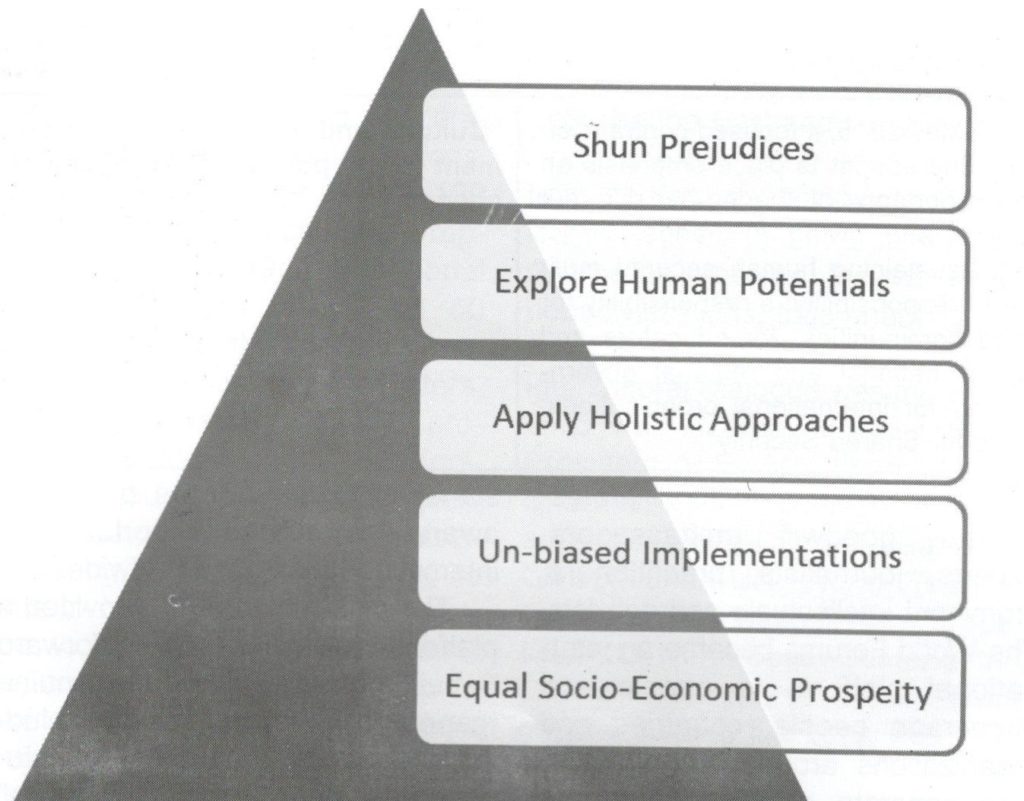
Human connectivity is the secret of human survival. The world is more and more interconnected but it does not mean that individuals and societies really live together as seen in the exclusion suffered by millions of poor, women, youth, migrants and disenfranchised minorities. Today there is more information, technology and knowledge available than ever before, but adequate wisdom is still needed to prevent conflicts, to eradicate poverty or to make it possible for all to learn in order to live in harmony in a safe world. 4th World Forum tried to search out solutions which are given below in a diagram.
The 4th World Forum also discussed how to achieve respect of “diversity”. It was agreed that “Diversity” was the only way out to maintain peaceful interaction and work for greater human integration. Its deliberations are given below as:
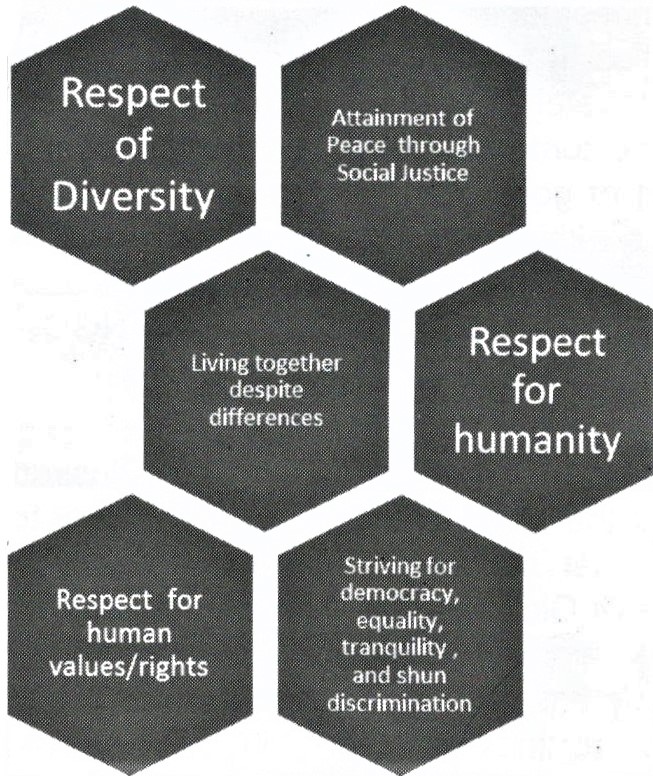
Peace is an on-going process, a long-term goal which requires constant engineering, vigilance and active participation by all individuals. It is a choice to be made on each situation, an everyday life decision to engage in sincere dialogue with other individual and communities. It was agreed to promote and disseminate values, attitudes and behaviours conducive to dialogue, non-violence and the rapprochement of cultures in line with the principles of the UNESCO Universal Declaration on Cultural Diversity.
4th World Forum pinpointed the following factors for peaceful co-existence and sustainable development.
Speech of H.E. Mr. Ilham Aliyev
President Ilham Aliyev delivered a speech at the opening session of the 4th World Forum. He rightly pointed out strategic importance of “Intercultural Dialogue” among different cultures, civilizations, faiths, sects and philosophies, terming it are the only possible way out from all kinds of prejudices, bigotries and enemies. It was attended by more than 40 acting and former presidents, vice presidents, prime ministers and parliament speakers.
He rightly projected Azerbaijan’s important role as a stabilizing factor in the region and beyond. He pointed out his government’s initiatives aiming at regional cooperation, predictability, and the strengthening of security measures in our region.
President Ilham also mentioned emerging global human crisis in shape of massive migration and termed external political and military interference into the internal affairs of these countries as factors of this human crisis. It led to radicalization of societies of the countries where the migrants are heading and as the consequence of that radicalization of the political elite, he further added.
He also reiterated Azerbaijan’s strong political will and resolve to fight against all odds. “Azerbaijan itself suffered from wars, occupation, humanitarian catastrophe as a result of Armenian aggression and occupation of our territory. This occupation has lasted for more than 20 years. Almost 20 percent of the internationally recognized part of Azerbaijan Nagorno-Karabakh and seven districts, which surround Nagorno-Karabakh, are under Armenian occupation”.
He further elaborated that, “This conflict is a result of Armenian aggression against its neighbor. It’s a result of separatism and war against Azerbaijan. And million Azerbaijanis suffered from that. They became refugees, and internally displaced persons. This figure is one of the highest per capita figures in the world”.
H.E. Mr. Ilham Aliyev talked about miraculous socio-economic development of Azerbaijan which demonstrated that the people of Azerbaijan are not only capable to live as an independent nation and to build their future, but also they are capable to achieve success in many areas.
“Our economy demonstrates sustainable development. We have a very low foreign debt, which is only 20 percent of our GDP, which is a little bit unusual for today’s world. In other words, we always try to spend less than we earn. Our currency reserves are five times bigger than our foreign debt”. He also shared workable formula for poverty reduction which was achieved through a broad regional development program, reducing poverty ten times within last 14 years, and now it’s less than six per cent. He also shared his valuable inputs on the issue of unemployment.
On macro-economic fronts he projected the diversification policy which is now paying dividends. Despite decline in oil prices, Azerbaijan’s economy is stable and sustainable. He mentioned series of structural reforms for the further diversification of national economy and development of non-oil economy which is now bigger than oil economy in terms of its share in GDP.
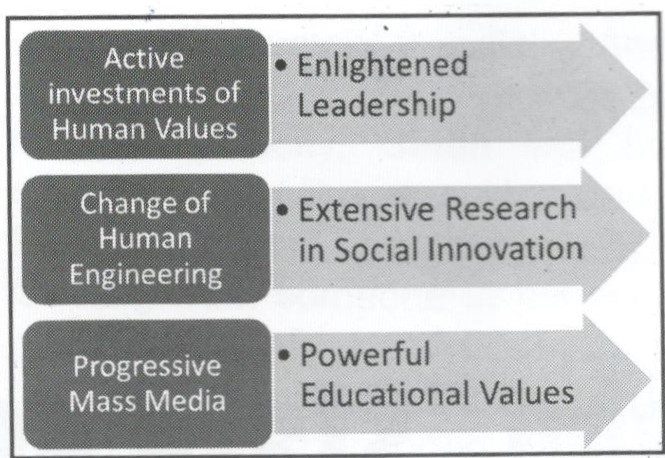
H.E. Mr. Ilham Aliyev also talked about his government achievement at international stage. “The international community respects us because we pursue an independent policy and also we always keep our word. In other words, we are a reliable partner, and we managed to build very positive, at the same time, pragmatic relations with our neighbors, which are based on history, friendship and mutual interests and mutual respect, and non-interference into internal affairs of each other”.
He also pinpointed different ongoing mega projects in different parts of his country. He described North-South Corridor as mega project for greater regional connectivity. He specifically mentioned aggression of Armenia and called upon international community to resolve the conflict with Armenia for achieving greater regional peace and socio-economic prosperity.
He labeled Azerbaijan as a cultural bridge. He pinpointed positive, sustainable, safe, stable development of his country for promoting atmosphere of mutual respect, multiculturalism, and respect for traditions, religion and roots of others. He termed Azerbaijan as a multi-confessional and multi-ethnic country.
Concluding Remarks
The 4th World Forum on Intercultural Dialogue was a great success in terms of participation on organizational as well as individual levels. Our world is at a critical point where human survival is endangered due to increasing incidents of “unilateralism”, polarization of power structure as well as communities, societies, group and countries, national protections/ economic nationalism and above all severe obsession with power. Denial of rule of law and disrespect of international treaties/ decrees and laws has already burnt the true spirits of humanity. Chessboard of power politics has spoiled face of humanity which needs to be rediscovered by “intercultural dialogue” by dancing among different cultures. It supports globalization and greater socio-economic prosperity, human dignity, security and sustainable development.
Lesson of successful series of World Forum on Intercultural Dialogue is that “Deeds/actions must speaker louder than words for the wellbeing of “children of lesser god”. We all jointly work for achieving an equitable world where the privileged class may not be in a position to dictate its terms and conditions.
Humanity is scared which should be respected. Human differences are main source of diversity which must not be used a decisive destruction. All types of discriminations must be dealt with iron hands because it is high time to rise above all kinds of prejudices, limitations, bigotries, stigmas and phobias.
We are children of God who made us equal so everybody must play their part for achieving an equal world for a shared prosperity. Azerbaijan is a good role model for refugees and migrant management which must be used for controlling ongoing global crisis of migrants. Azerbaijan is also an ideal country of peace, harmony, and peaceful co-existence for all the faiths, sects and minorities in the country which must be guideline for any kind of intercultural dialogue.


